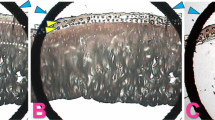Abstract
Interleukin 1 (IL-1) is a cytokine which induces cartilage proteoglycan (PG) depletion by inhibiting PG synthesis and increasing PG breakdown. Insulin-like growth factor I (IGF-I), in contrast, is known to promote matrix formation. We examined the effects of both mediators in a bovine tissue culture model. IL-1 dose-dependently inhibited PG formation of articular cartilage [half-maximal effect (EC50) at 4 ng/mll, while PG synthesis was increased by IGF-I (EC50) = 15 ng/ml). After inhibition of PG formation with IL-1 for 2 days and subsequent removal of free IL-1, addition of IGF-I dose-dependently accelerated restoration of the original rate of synthesis with a half-maximal effect at 20 ng/ml and a maximal effect at 50 ng/ml. The IGF-I concentration required to elicit a half-maximal effect on cartilage PG synthesis remained constant in the absence or presence of IL-1. We therefore conclude that inhibition of cartilage PG synthesis by IL-1 is not effected by damage to the IGF receptor. Synovial fluid (SF) of 40 patients with rheumatoid arthritis (RA) was found to contain 64 ± 6 ng IGF-I/ml (mean ± SEM). The reported effects of IGF-I in vitro therefore occurred at concentrations comparable to those present in joints in vivo. IL-1β was detectable (> 0.5 pg/ml) in 38 of 40 RA-SF samples (mean 28 ± 6 pg/ml). RA synovial tissue in culture released 330 ± 112 pg IL-1β x g tissue−1 x d−1, and this rate could be increased up to 70-fold by the addition of lipopolysaccharides (10 μg/ml). The observed accelerated recovery of cartilage PG synthesis by IGF-I after inhibition by IL-1 may be of relevance in rheumatic diseases like RA since IL-1 levels in RA-SF are known to vary considerably with time, and IGFs have been shown previously to be the most important promotors of cartilage PG synthesis in human SF.
Similar content being viewed by others
References
Benton H, Tyler JA (1988) Inhibition of cartilage proteoglycan synthesis by IL-1. Biochem Biophys Res Commun 154:421–428
Firestein GS, Alvaro-Garcia JM, Maki R (1990) Quantitative analysis of cytokine gene expression in RA. J Immunol 144:3347–3353
Hardingham TE, Bayliss MT, Rayan V, Noble DP (1992) Effects of growth factors and cytokines on proteoglycan turnover in articular cartilage. Br J Rheumatol 31(Suppl 1):1–6
Luyten FP, Hascall VC, Nissley SP, Morales TI, Reddi AH (1988) Insulin-like growth factors maintain steady-state metabolism of proteoglycans in bovine articular cartilage explants. Arch Biochem Biophys 267:416–425
Mannami K, Mitsuhashi T, Takeshita H, Okada K (1989) Concentration of interleukin 1 beta in serum and synovial fluid in patients with rheumatoid arthritis and those with osteoarthritis. J Jpn Orthop Assoc 63:1343–1352
McQuillan DJ, Handley CJ, Robinson HC, Ng K, Tzaicos C, Brooks PR, Lowther DA (1984) Effects of cycloheximide on chondroitin sulphate synthesis. Biochem J 224:977–988
McQuillan DJ, Handley CJ, Campbell MA, Bolis S, Milway VE, Herington AC (1986) Stimulation of proteoglycan biosynthesis by serum and insulin-like growth factor I in cultured bovine articular cartilage. Biochem J 240:423–430
McQuillan DJ, Handley CJ, Robinson HC (1986) Control of proteoglycan biosynthesis: further studies on the effect of serum on cultured bovine articular cartilage. Biochem J 237:741–747
Neidel J, Zeidler U (1993) Independent effects of interleukin 1 on proteoglycan synthesis and proteoglycan breakdown of bovine articular cartilage in vitro. Agents Actions 39:82–90
Nietfeld JJ, Wilbrink B, Otter W den, Huber J, Huber-Bruning O (1990) The effect of human interleukin 1 on proteoglycan metabolism in human and porcine cartilage explants. J Rheumatol 17:818–826
Schalkwijk J, Joosten LAB, Berg WB van den, VanWyk JJ, Putte LBA van de (1989) Insulin-like growth factor stimulation of chondrocyte proteoglycan synthesis by human synovial fluid. Arthritis Rheum 32:66–71
Schmidt MB, Mow VC, Chun LE, Eyre DR (1990) Effects of proteoglycan extraction on the tensile behavior of articular cartilage. J Orthop Res 8:353–363
Smith JB, Bocchieri MH, Sherbin-Allen L, Borofsky M, Abruzzo JL (1989) Occurrence of interleukin-1 in human synovial fluid: detection by RIA, bioassay and presence of bioassay-inhibiting factors. Rheumatol Int 9:53–58
Treadwell BV, Neidel J, Pavia M, Towle CA, Trice ME, Mankin HJ (1986) Purification and characterization of collagenase activator protein synthesized by articular cartilage. Arch Biochem Biophys 251:715–723
Trippel SB, VanWyk JJ, Foster MB, Svoboda ME (1983) Characterization of a specific somatomedin-C receptor on isolated bovine growth plate chondrocytes. Endocrinology 112:2128:2136
Tyler JA (1985) Articular cartilage cultured with catabolin (pig interleukin 1) synthesizes a decreased number of normal proteoglycan molecules. Biochem J 227:869–878
Tyler JA (1989) Insulin-like growth factor I can decrease degradation and promote synthesis of proteoglycan in cartilage exposed to cytokines. Biochem J 260:543–548
Tyler JA, Bolis S, Dingle JT, Middleton JFS (1992) Mediators of matrix catabolism. In: Kuettner K et al. (eds) Articular cartilage and osteoarthritis. Raven, New York, pp 251–264
Van de Loo AAJ, Berg WB van den (1990) Effects of murine recombinant interleukin 1 on synovial joints in mice: measurements of patellar cartilage metabolism and joint inflammation. Ann Rheum Dis 49:238–245
Van den Berg WB, Loo FA van de, Otterness I, Arntz O, Joosten LA (1991) In vivo evidence for a key role of IL-1 in cartilage destruction in experimental arthritis. Agents Actions Suppl 32:159–163
Van den Berg WB, Loo FAJ van de, Lent PLEM van, Joosten LAB (1993) Mechanisms of cartilage destruction in joint inflammation. Agents Actions [Suppl] 39:49–60
Westacott CI, Whicher JT, Barnes IC, Thompson D, Swan AJ, Dieppe PA (1990) Synovial fluid concentrations of five different cytokines in rheumatic diseases. Ann Rheum Dis 49:676–681
Yodlowski ML, Hubbard JR, Kispert J, Keller K, Sledge CB, Steinberg JJ (1990) Antibody to interleukin 1 inhibits the cartilage degradative and thymocyte proliferative actions of rheumatoid synovial culture medium. J Rheumatol 17:1600–1607
Author information
Authors and Affiliations
Rights and permissions
About this article
Cite this article
Neidel, J., Schulze, M. & Sova, L. Insulin-like growth factor I accelerates recovery of articular cartilage proteoglycan synthesis in culture after inhibition by interleukin 1. Arch Orthop Trauma Surg 114, 43–48 (1994). https://doi.org/10.1007/BF00454736
Received:
Issue Date:
DOI: https://doi.org/10.1007/BF00454736




